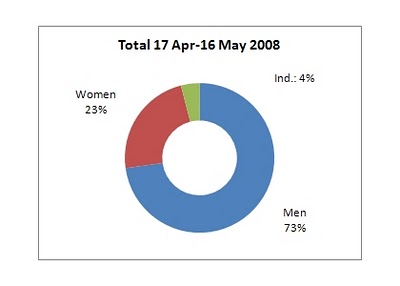It has always fascinated me why male names dominate the readers’ letter pages in newspapers, the original home for crowdsourced comment. What’s more, it’s a trend that plays out online too: men are already significantly noisier on Google Buzz, for example, and dominate online comment in subjects like politics and media.
I was pleased to discover around this time last year that the unequal gender split bothered one @patroclus too (aka writer Fiona Campbell-Howes) who actually set about documenting the trend in 2008 with the blog Guardianletters.blogspot.com/.
She never got any real answers from the newspapers she studied and eventually she let the blog run dry. But the old posts are still there to see, with some revealing graphs, too. The chart below, for example, shows the percentage split between men, women and indiscriminate for April-May 2008 at the Guardian and Observer.
Most recently, the theme was picked up by Radio 4’s Woman’s Hour in January 2010.
“Why is the letters page, of whichever newspaper you care to choose, invariably dominated by men?” the programme asked. The Observer has actually called for more women to write in.
Jenni Murray talked to Stephen Pritchard, readers’ editor at the Observer, and Sarah Sands, deputy editor of the London Evening Standard. Pritchard and Sands seemed to agree that time was a crucial factor – maybe women had less of it. Sands also identified a reluctance on the part of women to declare their opinion publicly.
But does the lack of time and innate modesty theory really hold true, when we look at the amount of female time spent, and number of views shared, on MumsNet, or fashion and food blogs and forums?
I’d be interested to see some more research in this area. It’s a theme that journalist Gaby Hinsliff picks up on in her introductory post for today’s International Women’s Day themed LabourList. Of political blogging, she says “there are too many women waiting to be invited to blog, where men just pile in”.
Like Hinsliff, I’m reluctant to see female-only gimmicks used to remedy the situation, but simultaneously intrigued by the louder male voice, a phenomenon that may be key in understanding why men dominate executive boards across so many industries. Yes, we have a lot of female journalists in the newsroom, but only a handful of women make it to the top levels of the media industry – and even fewer become CEO or editor.
